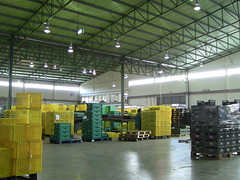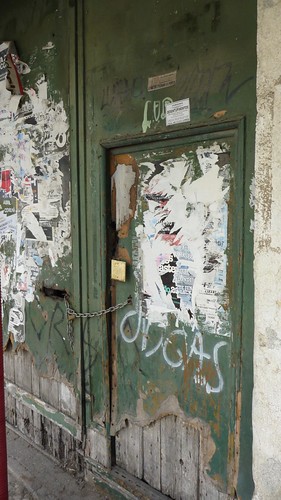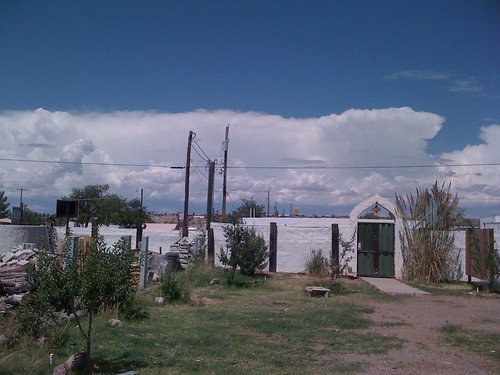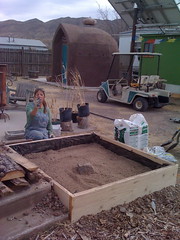The navigation system is scolding me with its female voice in Portuguese, I missed yet another turn as I cruise passed yet another apple orchard. It’s the end of September and I’m in what feels like the middle of nowhere Portugal, late for my appointment to visit the Frubaça Fruit Company. As a fruit producer and juice maker their products have caught my attention over the last few years when I am in Portugal. Besides their fruit, their fresh juices have this great combination of simple ingredients (just the fruit) and what seemed to be this ethical business philosophy that I wanted to examine first-hand. So there I am, sort of lost but hoping that just beyond this next beautiful hill I will find what I’m looking for. Suddenly as I’m giving up hope, there it is, with stacks and stacks of fruit crates lining the outside, I’ve arrived at the Coppa (Cooperative that grows the fruit) facility.
 Things are extra busy inside Frubaça, it feels like the high season for apples as they roll passed me on the conveyer belt. At one stage they go under a large machine that shines a light on them, “Infrared Scanning,” Jorge Periquito, president of Frubaça, explains as we walk passed extremely long assembly lines. I can barely hear him over the sound of so many devices and machines as he explains the details of this state-of-the-art infrared scanner that detects any damage or defects to the apples. We go on to see several other fruits being sorted and packaged for sending out to supermarkets and other places throughout the country. Some of the labels are even printed in Spanish and I learn later that beyond Spain the company sends their products to France as well. Hard to believe this modest facility is serving up fruit even beyond the borders of Portugal, but the more I learned about Frubaça, the more I understood, this is no ordinary operation.
Things are extra busy inside Frubaça, it feels like the high season for apples as they roll passed me on the conveyer belt. At one stage they go under a large machine that shines a light on them, “Infrared Scanning,” Jorge Periquito, president of Frubaça, explains as we walk passed extremely long assembly lines. I can barely hear him over the sound of so many devices and machines as he explains the details of this state-of-the-art infrared scanner that detects any damage or defects to the apples. We go on to see several other fruits being sorted and packaged for sending out to supermarkets and other places throughout the country. Some of the labels are even printed in Spanish and I learn later that beyond Spain the company sends their products to France as well. Hard to believe this modest facility is serving up fruit even beyond the borders of Portugal, but the more I learned about Frubaça, the more I understood, this is no ordinary operation.
First there’s the technology: GPS, RFID, Infrared, High Pressure Processing (HPP) Machines, are just some of the tools that play a critical role in how this natural fruit company functions. In the case of the HPP machine, we’re talking about a device with few equals anywhere in the world, a piece of technology based on an old idea (pressure), that isn’t even known by most other companies out there. It simulates the pressure equal to 60 kilometers under the sea, a pressure at which microrganisms are destroyed but the integrity of the juice remains in tact.
 Jorge and I walk up the stairs to the giant metal tube where small bottles of mango juice are being loaded in. This new room we’re in has a fantastic scent of fruit that hits you like the freshest mountain breeze imaginable. As the process begins as we watch the digital display of the pressure meter rise. Nearby another version of the same machine is being loaded up with little packs of apple sauce. Again, all around us, conveyer belts carry bottles of juice to their next destination. Near the juicing machines I’m asked not to take any pictures as the machine manufacturers are very protective of their technology, I leave the camera off and focus my eyes on the apple foam flowing into a nearby drain. I’m temped to cup my two hands together and drink some delicious looking foam.
Jorge and I walk up the stairs to the giant metal tube where small bottles of mango juice are being loaded in. This new room we’re in has a fantastic scent of fruit that hits you like the freshest mountain breeze imaginable. As the process begins as we watch the digital display of the pressure meter rise. Nearby another version of the same machine is being loaded up with little packs of apple sauce. Again, all around us, conveyer belts carry bottles of juice to their next destination. Near the juicing machines I’m asked not to take any pictures as the machine manufacturers are very protective of their technology, I leave the camera off and focus my eyes on the apple foam flowing into a nearby drain. I’m temped to cup my two hands together and drink some delicious looking foam.
During my two hours at the plant Jorge explains the company, cooperative actually, from the beginning. He is one of 5 people that, since 1992, oversee the cooperative, all of which are from this rural community. They invested heavily in technology and go regularly to trade fairs and conferences all over the world, in an effort to know all the latest methods for handling the growing of fruit and production process. They’re not trying to be organic, their intention is to only use pesticides when it is absolutely necessary, a system of evaluation known as “integrated pest management.”
At some point I asked Jorge about business, his approach to the global demand that says – a company must grow and make more profit year after year. His response was that the company is not interested in growth for the sake of growth. They won’t try to fight price wars to sell the cheapest fruit, choosing instead to offer the best quality, in hopes that customers recognize the value. They won’t move or expand, this is their community and their intention is to keep it healthy and working. Then, a conversation topic I never expected to arise – arose: “The socioeconomic model of the urban setting is finished.” Technology from the city applied back in the countryside can help create a healthy and sustainable life in a way that is increasingly hard to achieve in the urban setting.
For a moment I though Jorge must have been listening to my latest podcasts or reading my tweets. But then I realized the connection- sustainable business. Quality food with real ingredients produced by a proud community that has been there for generations. Using the latest in technology and applying it to old fashion ideas. It all connects back to the theme of doing things differently then the conventional way. Taking steps to build lives that are about something other than making money and consuming as much as possible. Once again I had stumbled upon the kind of ideas and practices that have the power to change our world.
 The goal to live life on their terms took Ryanne and Jay from New York City to San Francisco and eventually to Western Virginia. It is here that this dynamic couple set out to build their own home, grow some of their own food, work on their terms, and generally tinker with life choices that were previously not an option or unaffordable. The result is an inspiring start to healthy, stimulating and more sustainable life at a time where so many feel such goals are unreachable.
The goal to live life on their terms took Ryanne and Jay from New York City to San Francisco and eventually to Western Virginia. It is here that this dynamic couple set out to build their own home, grow some of their own food, work on their terms, and generally tinker with life choices that were previously not an option or unaffordable. The result is an inspiring start to healthy, stimulating and more sustainable life at a time where so many feel such goals are unreachable.


